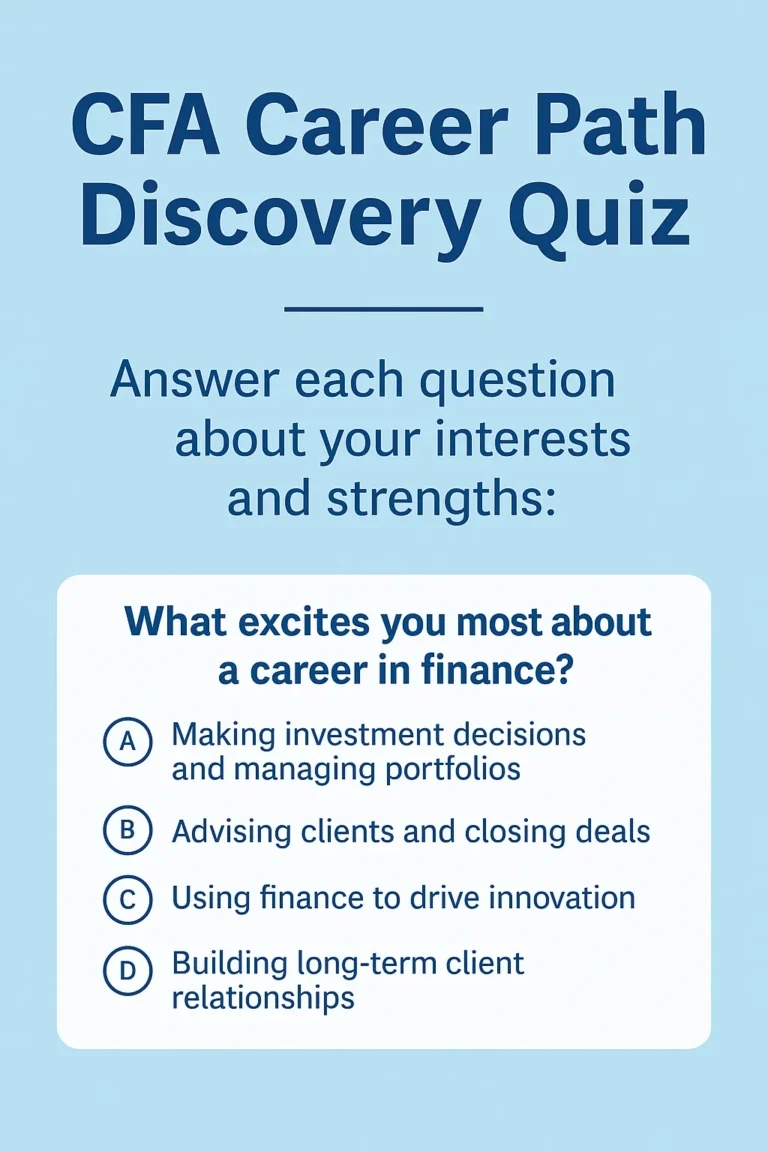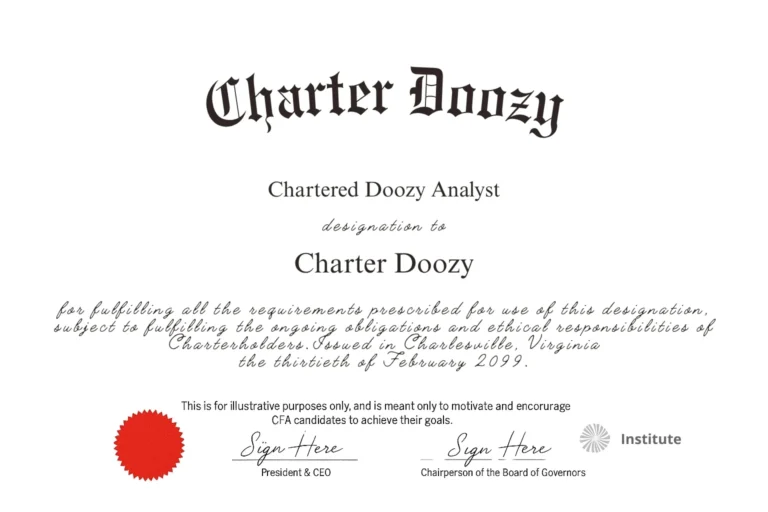Rethinking CFA Careers in a Changing World
The CFA designation has long been seen as the passport to traditional finance careers. Portfolio manager. Equity analyst.
Investment banker. These roles have defined the path for thousands of CFA charterholders over the decades.
But the landscape is shifting.
The finance industry today looks very different from what it did ten or even five years ago.
Technology, sustainability, regulation, and globalization have all redefined how capital moves, where value is created, and what skills are in demand.
As the financial world evolves, so too do the career opportunities available to CFA candidates.
No longer confined to the classic roles, CFA Charterholders are building careers in fintech, ESG investing, data analytics, corporate strategy, and beyond.
These paths may not have existed (or were barely visible) when the CFA curriculum was first designed, but they now represent some of the most dynamic and impactful areas in the finance world.
This is not a story of abandoning the old.
Traditional careers remain highly respected and rewarding. Instead, it’s about understanding how the CFA qualification positions you to succeed across a much broader spectrum of roles, and how you can align your professional path with your personal strengths and interests.
In this article, we’ll explore what “traditional” and “non-traditional” CFA careers really mean, how the job market has shifted, and what this means for your future.
You’ll get a detailed breakdown of career paths, role types, and practical considerations to help you decide which direction to explore next.
Let’s begin by defining the two sides of this expanding career spectrum.

What Do We Mean by “Traditional” and “Non-Traditional”?
Traditional CFA Careers
Traditional CFA careers refer to the well-established roles in the finance industry that the CFA Program was originally designed to support.
These include portfolio management, equity and credit research, investment banking, and wealth management.
They typically involve working for investment firms, banks, or asset managers and are focused on the analysis, allocation, and stewardship of capital.
These roles are structured, rigorous, and built on decades of industry practice.
They often come with clearly defined career ladders, regulatory frameworks, and professional expectations.
Many CFA candidates pursue the charter specifically to enter or progress within these paths.
Non-Traditional CFA Careers
Non-traditional CFA careers fall outside the classic investment and banking tracks but still benefit greatly from the CFA skill set.
These are roles in fintech, ESG investing, compliance, data science, corporate strategy, investor relations, and even entrepreneurship.
They may be newer, more interdisciplinary, or based in industries that have only recently started to value CFA expertise.
What connects these roles is that they are finance-adjacent.
They require the same core strengths – analytical thinking, financial literacy, ethical judgment.
But they apply them in broader contexts.
As the financial world becomes more integrated with technology, regulation, and sustainability, these careers are becoming not just viable but essential.
Why the Line Is Blurring
The divide between traditional and non-traditional is not always clear-cut.
A portfolio manager might now use machine learning to guide investment decisions.
A fintech product manager may need to understand capital markets inside out.
The key is recognizing that CFA candidates are no longer limited to one track.
Instead, the charter equips professionals to move confidently across sectors, disciplines, and business models.
Understanding both categories is the first step in identifying the path that fits your strengths, interests, and long-term goals.

Why the Shift?
A Changing Financial Landscape
The financial industry has undergone major transformation.
Advances in technology, the rise of data-driven decision-making, and the global push toward sustainability have all played a role.
Traditional banking and investment firms are adapting.
At the same time, entirely new types of companies are entering the finance space.
Digital platforms, automated trading, decentralized finance, and ESG-focused investing have changed how capital flows and how value is assessed.
These developments have created new demands (and new opportunities) for professionals with strong analytical and ethical foundations.
Employers Want Versatility
In today’s market, employers are not just hiring for a job.
They’re hiring for adaptability too.
They want people who can think critically, understand complex financial systems, and bring clarity to uncertain decisions.
CFA candidates and Charterholders fit this profile.
The CFA Program teaches technical knowledge.
But it also emphasizes ethics, decision-making under uncertainty, and a deep understanding of capital markets.
These are skills that matter in many roles, not just in investment firms.
The Rise of Finance-Adjacent Roles
As financial tools and thinking spread into other industries, CFA Charterholders are increasingly valued outside the traditional sector.
Tech companies need financial insight.
Corporations need strategic planners.
Regulators need analysts who understand markets.
Foundations need professionals who can allocate capital with impact in mind.
This shift has broadened the playing field.
CFA candidates are no longer confined to Wall Street.
They can now build careers in sectors as diverse as technology, healthcare, government, education, and sustainability.
A Time of Opportunity
The market has changed, but that’s not a loss – it’s actually a gain.
The CFA designation still opens doors in traditional finance and investments.
But it also unlocks access to newer, more diverse, and more flexible career paths.
CFA candidates now have more ways to apply their knowledge, build meaningful careers, and shape the future of finance.
Understanding this shift is essential. It’s not about replacing the old. It’s about expanding the range of what’s possible.

Traditional CFA Career Paths (and What They Involve)
The CFA Program was originally built to serve the traditional pillars of the finance industry – and those foundations still hold strong today.
From portfolio management to investment banking, these roles continue to attract candidates who value structure, depth, and the challenge of making high-stakes decisions.
They are well-defined, well-respected, and often offer clear career progression.
In this section, we’ll explore the core categories of traditional CFA careers, the roles they include, the work involved, and the types of professionals who thrive in them.
| Category | Roles |
|---|---|
| Portfolio Management (Asset Management) | Portfolio Manager Investment Analyst (Buy-Side) Chief Investment Officer (CIO) |
| Investment Banking | Investment Banking Analyst Investment Banking Associate |
| Investment Research | Equity Research Analyst (Sell-Side) Investment Research Analyst (Buy-Side) Credit Analyst |
| Risk Management | Risk Analyst (Financial Risk Analyst) Risk Manager |
| Corporate Finance (Financial Analysis & Strategy) | Corporate Financial Analyst (FP&A Analyst) Treasury Analyst/Manager Chief Financial Officer (CFO) |
| Wealth Management and Financial Planning | Private Wealth Manager / Private Banker Financial Advisor / Planner |
| Consulting and Advisory Services | Management/Strategy Consultant Investment Consultant Valuation Analyst |
| Alternative Investments | Hedge Fund Manager/Analyst Private Equity Associate Venture Capital Analyst Real Estate Analyst |
| Sales & Trading | Securities Trader Stockbroker / Sales Representative |
Portfolio Management
Portfolio management remains one of the most common and respected career paths for CFA Charterholders. Professionals in this space are responsible for managing investment portfolios on behalf of individuals, institutions, or funds. The focus is on asset allocation, risk management, and achieving specific financial objectives.
Roles
Portfolio Manager
Assistant Portfolio Manager
Buy-Side Analyst
Chief Investment Officer (CIO)
Work Involved
Portfolio managers analyze markets, select securities, and monitor performance against benchmarks. They often lead a team of analysts and researchers, using both qualitative insights and quantitative models to guide investment decisions.
Best Fit
This path suits professionals who enjoy research, decision-making under uncertainty, and working with large datasets. Strong communication skills are also essential—especially when explaining strategy to clients or internal stakeholders.
Doozy Digest
A newsletter for CFA candidates
Subscribe for:
✔ Insightful tips
✔ Expert advice
✔ Career motivation
✔ Exam inspiration
Stay updated and subscribe today!
Investment Banking
Investment banking is high-stakes, fast-paced, and competitive. It involves advising companies on mergers, acquisitions, capital raising, and strategic transactions. Analysts and associates in these roles conduct financial modeling, perform valuations, and prepare client presentations.
Roles
Investment Banking Analyst
Investment Banking Associate
M&A Advisor
Capital Markets Specialist
Work Involved
The job includes financial analysis, due diligence, deal structuring, and client engagement. Long hours and demanding timelines are common, especially in deal execution phases.
Best Fit
This path is ideal for individuals who are detail-oriented, thrive under pressure, and enjoy problem-solving in high-intensity environments. Comfort with complex models and the ability to communicate with corporate executives are key strengths.
Investment Research
Investment research roles focus on analyzing companies, sectors, or markets to generate actionable insights. Analysts provide recommendations based on in-depth study of financial statements, market trends, and industry developments.
Roles
Equity Research Analyst (Sell-Side)
Investment Analyst (Buy-Side)
Sector Analyst
Credit Analyst
Work Involved
Sell-side analysts publish research reports for clients of investment banks or brokerages, while buy-side analysts support portfolio managers inside asset management firms. The work involves modeling earnings, forecasting performance, and writing reports.
Best Fit
These roles attract professionals who are curious, methodical, and strong writers. A passion for digging deep into financials and staying current on markets is essential.
Risk Management
Risk professionals assess and manage exposure to market, credit, liquidity, and operational risks. They help financial institutions stay within their risk appetite and comply with regulatory expectations.
Roles
Market Risk Analyst
Credit Risk Manager
Operational Risk Specialist
Chief Risk Officer (CRO)
Work Involved
Risk managers use models, scenarios, and stress tests to evaluate potential losses under different conditions. They also develop frameworks and controls to mitigate those risks.
Best Fit
This path suits analytical thinkers with a cautious mindset. It’s ideal for professionals who enjoy systems thinking, statistical modeling, and working behind the scenes to keep institutions secure.
Corporate Finance and Treasury
In corporate finance, professionals support the strategic financial health of a company. They forecast performance, allocate capital, and make budgeting decisions. Treasury teams specifically manage liquidity, cash flow, and funding.
Roles
Corporate Financial Analyst (FP&A)
Treasury Analyst or Manager
Director of Finance
Chief Financial Officer (CFO)
Work Involved
This work involves scenario planning, budget management, capital investment evaluation, and reporting to senior leadership. Treasury roles include managing banking relationships, issuing debt, and hedging currency risk.
Best Fit
Ideal for those who want to work within a company rather than for an external firm. Strong Excel skills, business intuition, and comfort with both strategy and operations are key.
Wealth Management and Financial Planning
Wealth managers help individuals and families achieve their financial goals. This includes managing investments, planning for retirement, and offering advice on taxes, estate planning, and insurance.
Roles
Financial Advisor
Private Banker
Wealth Manager
Relationship Manager
Work Involved
Professionals assess client needs, build investment portfolios, and provide ongoing advice. They often work in client-facing roles and must maintain strong relationships over time.
Best Fit
This career path is well-suited for those who enjoy working with people, building trust, and combining technical knowledge with personal guidance. Emotional intelligence and listening skills are just as important as financial expertise.
Consulting and Valuation
CFA Charterholders also find roles in consulting firms or advisory practices. These positions involve financial modeling, valuation, strategic analysis, and performance improvement for corporate clients.
Roles
Strategy Consultant
Valuation Analyst
Transaction Services Associate
Business Performance Advisor
Work Involved
Consultants conduct in-depth financial analysis to advise on business decisions, M&A transactions, or operational changes. They may work across industries and help clients solve a wide range of financial challenges.
Best Fit
This track appeals to those who like variety, problem-solving, and working in team-based environments. It requires adaptability, clear thinking, and strong communication skills.
Alternative Investments
Alternative investments include hedge funds, private equity, venture capital, and real estate. These roles involve identifying, evaluating, and managing investments that fall outside of public equity or fixed income.
Roles
Hedge Fund Analyst
Private Equity Associate
Venture Capital Analyst
Real Estate Investment Analyst
Work Involved
Professionals evaluate deals, conduct due diligence, build complex models, and work closely with management teams. Investment horizons are longer, and performance depends on both analysis and active involvement.
Best Fit
This path suits independent thinkers who are entrepreneurial and comfortable with ambiguity. A strong grasp of valuation and market dynamics is essential.
Sales and Trading
Sales and trading roles revolve around market execution. Traders buy and sell securities, while salespeople work with clients to structure trades and share market insights.
Roles
Securities Trader
Sales Trader
Institutional Sales Representative
Fixed Income or Derivatives Specialist
Work Involved
These roles demand quick decision-making, deep market knowledge, and constant monitoring of price movements and news. Many roles are now automated or require strong quantitative skills.
Best Fit
This career path is for those who are energetic, decisive, and thrive in high-pressure, fast-moving environments. A passion for markets and strong mental math are major assets.
Each of these traditional paths offers clear, tested routes to professional success.
But they’re no longer the only ones.
In the next section, we’ll explore how CFA candidates can build careers beyond these classic tracks – without leaving finance behind.

Non-Traditional (Finance-Adjacent) CFA Career Paths
s the finance industry has evolved, so too have the opportunities for CFA Charterholders.
Today, professionals are finding fulfilling careers in roles that weren’t even on the radar a decade ago.
These finance-adjacent paths (spanning fintech, ESG, strategy, analytics, and more) offer new ways to apply the CFA skill set in environments that are dynamic, creative, and interdisciplinary.
In this section, we’ll take a closer look at these emerging opportunities, unpacking the roles, responsibilities, and personality traits that align best with each.
| Category | Roles |
|---|---|
| Fintech and Digital Finance | Fintech Product Manager Cryptocurrency/Blockchain Analyst |
| ESG and Sustainable Investing | ESG Analyst Impact Investment Analyst |
| Corporate Finance & Strategy | Corporate Development (M&A) Manager Financial Planning & Analysis (FP&A) Manager Treasury Analyst |
| Risk Management & Compliance | Risk Analyst/Manager Compliance Officer |
| Consulting and Advisory Services | Management Consultant (Financial/Strategy) |
| Data Analytics & Quantitative Finance | Quantitative Analyst (Quant) Financial Data Scientist |
| Investor Relations & Communications | Investor Relations Manager |
Fintech and Digital Finance
Fintech blends finance with technology. It’s a fast-growing space where startups and large institutions build platforms, apps, and infrastructure to modernize financial services. CFA charterholders are increasingly valued in this world for their understanding of markets, regulation, and investor needs.
Roles
Fintech Product Manager
Crypto/Blockchain Analyst
Financial Systems Strategist
Digital Asset Analyst
Work Involved
Professionals in fintech work on designing and refining financial products—from robo-advisors and trading platforms to payment apps and blockchain protocols. Product managers translate user needs into technical requirements. Analysts assess the viability of new digital assets or technologies. Some work on tokenomics, smart contracts, or building investment tools using real-time data.
Best Fit
This path is ideal for tech-curious professionals who enjoy innovation, rapid change, and building things from the ground up. Adaptability, creativity, and cross-functional collaboration are essential. A background or interest in coding, product design, or UX is helpful but not required.
ESG and Sustainable Investing
Environmental, Social, and Governance (ESG) investing has moved from niche to mainstream. Investors and firms now actively consider sustainability alongside financial return. CFA charterholders bring rigor and analytical discipline to this space.
Roles
ESG Analyst
Impact Investment Analyst
Sustainable Finance Advisor
Responsible Investing Strategist
Work Involved
ESG professionals evaluate companies and assets based on sustainability metrics and risk factors. This could involve analyzing carbon emissions, labor practices, supply chain ethics, or governance structures. They work with asset managers, foundations, pension funds, or consulting firms to incorporate ESG insights into portfolios.
Best Fit
This path suits those who want their work to align with their values. Professionals here are analytical, mission-driven, and comfortable with evolving standards. Strong research skills and the ability to interpret non-financial data are key.
Corporate Strategy and Development
Outside of financial institutions, CFA charterholders are finding roles in corporate strategy and internal M&A. These positions are about helping a company grow, restructure, or respond to changing markets—using financial thinking as a foundation.
Roles
Corporate Development Associate
Strategy Analyst
M&A Manager
Business Planning Lead
Work Involved
These professionals evaluate acquisition targets, conduct internal performance reviews, assess new market opportunities, and support long-term strategic planning. The work is highly project-based and often confidential. Financial modeling, valuation, and scenario planning are core tasks.
Best Fit
Ideal for those who enjoy high-level thinking, problem-solving, and being part of internal decision-making. This path blends analytical depth with strategic insight. It suits professionals who want to influence direction, not just execution.
Compliance and Regulatory Risk
The post-2008 world brought stricter regulation and greater demand for financial professionals who understand both compliance and capital markets. CFA charterholders are well-positioned to help organizations meet regulatory expectations while maintaining business goals.
Roles
Compliance Officer
Risk & Controls Analyst
Financial Regulations Consultant
Governance Advisor
Work Involved
Compliance professionals design and enforce internal policies, monitor transactions for anomalies, and ensure regulatory filings are accurate. They liaise with legal teams and regulators, conduct internal audits, and advise on ethical frameworks.
Best Fit
This path is well-suited for those who are meticulous, process-driven, and ethically grounded. It’s ideal for professionals who want to reduce risk and increase transparency within financial systems.
Data Analytics and Quantitative Finance
Data is transforming finance. CFA charterholders with analytical minds and a knack for numbers can thrive in data-heavy roles that support better decision-making, model development, and automation.
Roles
Financial Data Analyst
Quantitative Researcher
Data Science Associate (Finance)
Algorithmic Trading Analyst
Work Involved
These professionals clean and analyze large datasets, build predictive models, and work with engineers to automate investment or risk processes. They may use Python, R, SQL, or other tools to extract insight from data. In some cases, they develop and backtest strategies for trading desks or investment teams.
Best Fit
This path is ideal for logical, math-oriented thinkers. Those who enjoy coding, experimenting, and solving abstract problems will find it rewarding. It’s also a good fit for professionals who want to future-proof their skill set in a data-first world.
Investor Relations and Communications
Investor relations (IR) bridges the gap between companies and the investment community. CFA charterholders are increasingly seen as valuable assets in IR teams for their ability to communicate financial information clearly and credibly.
Roles
Investor Relations Manager
IR Analyst
Corporate Communications (Finance-Focused)
Public Reporting Officer
Work Involved
IR professionals prepare earnings releases, investor presentations, and annual reports. They handle investor inquiries, manage earnings calls, and advise executives on messaging to markets. Their role is part financial analysis, part storytelling.
Best Fit
This path suits professionals who combine technical knowledge with strong communication skills. It’s ideal for those who are articulate, organized, and comfortable representing their company in public or high-stakes settings.
Entrepreneurship, Education, and Niche Advisory
Some CFA charterholders carve out paths that don’t fit any traditional mold. They launch fintech ventures, teach finance at universities, or advise family offices and startups. These roles may be less structured but offer autonomy and variety.
Roles
Fintech Founder
CFA Tutor or Lecturer
Independent Financial Consultant
Investment Coach or Content Creator
Work Involved
Entrepreneurs build solutions to problems they’ve observed in the market. Educators develop curriculum, mentor students, and publish research. Advisors support a range of clients, often combining personal expertise with customized service.
Best Fit
This category suits self-starters who value independence, creativity, and impact. It’s ideal for professionals with a niche skill set or personal brand who want to build something of their own.
The finance world is changing.
And CFA Charterholders are no longer confined to traditional institutions or job titles.
With curiosity, flexibility, and focus, candidates can shape careers that align with their interests and add real value across a wide and expanding range of industries.

Choosing the Right Path for You
#1 Align with your interests
Start by asking yourself what genuinely interests you. Do you enjoy analyzing data, building models, or understanding macroeconomic trends? Or are you more motivated by working with people, solving real-world problems, or building new products?
The CFA charter opens doors, but your satisfaction will depend on how well your role matches your personal strengths and curiosity. Some thrive on the structure and clarity of portfolio management. Others are more at home in the fluid, fast-paced world of fintech or corporate strategy.
#2 Understand the day-to-day work
Titles can be misleading.
Two investment analysts may have completely different jobs depending on where they work. One might spend most of their time in spreadsheets. The other could be preparing decks for client meetings or evaluating startups in the field.
Try to learn what a typical day looks like in any role you’re considering. Speak to professionals in that space. Ask about the hours, the pressure, the pace, and the culture. Don’t just think about the title… think about the lifestyle.
#3 Assess your personality and working style
Some roles require deep focus and solitary analysis. Others are driven by collaboration, persuasion, or quick decision-making. Are you energized by people or drained by meetings? Do you prefer structure or flexibility? Routine or variety?
If you’re analytical and cautious, risk management or credit analysis might suit you. If you’re social and intuitive, wealth management or investor relations could be a better fit. If you’re innovative and adaptive, fintech or strategy may be the right direction.
#4 Factor in your long-term goals
Where do you want to be in 5, 10, or 20 years? Some career paths offer clearer promotion tracks. Others may require you to create your own trajectory.
Think about how the path you choose now can position you for where you want to go. The CFA designation gives you a strong base, but how you build on it is up to you.
#5Stay open to evolution
You don’t have to get it perfect the first time. Many CFA Charterholders move between paths – starting in research, then shifting to corporate finance, strategy, or consulting.
Your career will likely evolve as you gain experience, refine your interests, and respond to changes in the market. What matters most is building skills, earning credibility, and staying engaged with your work.
Choosing a path isn’t about locking yourself in.
It’s about taking a thoughtful first step – and knowing you have the flexibility to adjust along the way.
Not Sure Which CFA Career Path Is Right for You?
Take our CFA Career Path Discovery Quiz – a fast, insightful tool designed to match your personality, interests, and working style to the most suitable career paths for CFA Charterholders.
Whether you’re drawn to markets, deals, strategy, or data, this quiz will help you uncover where you’ll thrive.
It’s quick, practical, and tailored specifically for aspiring and current CFA candidates exploring both traditional and non-traditional finance careers.
Start the quiz now and get a personalized breakdown of your top-fit roles – from portfolio management to fintech, ESG, risk, and more.
Key Takeaways for CFA Candidates
Traditional roles remain strong
Portfolio management, research, investment banking, and corporate finance still offer well-defined, respected paths. These roles continue to value the CFA charter and reward deep financial expertise and discipline.
The landscape is broader than ever
The finance job market has expanded. CFA Charterholders are now making an impact in fintech, ESG, data analytics, investor relations, and beyond. These roles may not be conventional, but they increasingly demand the same core skills: analysis, judgment, and integrity.
Your skill set is highly transferable
The CFA Program teaches a universal language of finance. That foundation allows you to move across industries and functions. You’re not limited to one firm, one role, or even one sector.
Career satisfaction depends on fit
What matters most is not the prestige of the title—but how well it aligns with your strengths, interests, and goals. Choose a path where you can grow, contribute, and stay motivated.
You’re allowed to evolve
Your first job out of the CFA Program doesn’t define your entire career. The world is changing quickly. Stay open to new opportunities, and give yourself permission to pivot when the time is right.
You have options
This is a great time to be a CFA candidate. Whether you follow a classic route or explore a less traditional one, you have more opportunities than ever to make an impact and build a meaningful career in finance.

Final Thoughts
The CFA designation has never been more relevant.
While it continues to open doors in traditional finance roles, its value now extends far beyond the well-worn paths of asset management and investment banking.
The financial world is expanding, and with it, the opportunities for CFA Charterholders.
From fintech and ESG to corporate strategy and data analytics, new frontiers are emerging that need the kind of disciplined thinking and ethical grounding the CFA Program cultivates.
Your journey doesn’t have to follow a single script.
You can build a career that reflects your interests, your strengths, and the way you want to contribute to the world.
Whether you prefer the structure of a well-established firm or the creativity of a fast-moving startup, there’s space for you in today’s finance landscape.
So explore the options.
Ask questions.
Be strategic.
But most importantly – stay open.
The CFA charter isn’t just a credential.
It’s a launchpad.
Where you take it is up to you.


